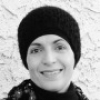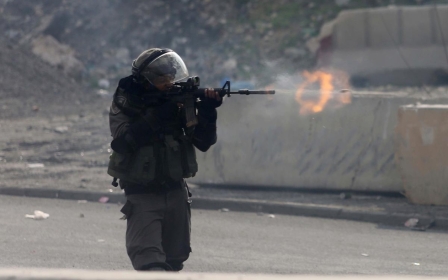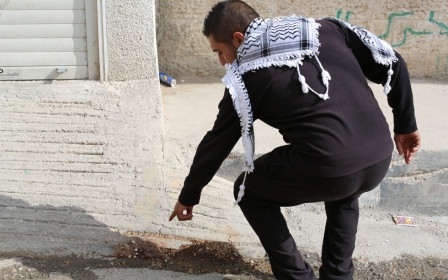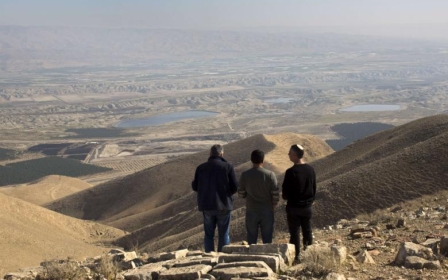The police are the ‘bad guys’ in occupied Palestine
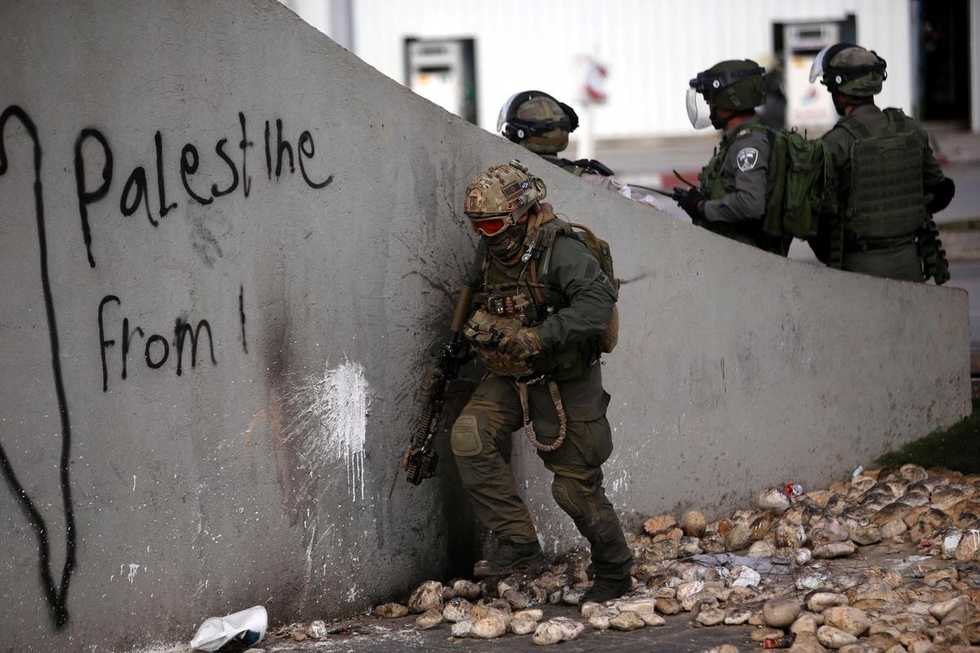
In the Arab world, one often hears the expression “police are in the service of the people.” Although the idiom is very popular, it is usually spoken in a sarcastic way as a political joke.
People who have little power over their lives use the phrase to mock the conduct of their notorious police forces. These forces, after all, have a habit of terrorising people and spreading fear. In Occupied Palestine, however, the expression is perceived quite differently, because the Israeli police there have nothing whatever to do with serving people. It can't even be a joking matter.
When I was a small child studying in grade two at one of Gaza's elementary schools, we were taught many lessons that have never made sense to me. One of them was about the police. It was a challenging topic that I, like many of my classmates, struggled to grasp. According to our teacher, police were the “good guys” whose job it was to keep the order and to protect people.
As our UNRWA teacher portrayed them, they were heroes who catch “bad guys” and bring them to justice. This account of them, however, had no connection at all with the reality of our daily lives. The lesson plan didn’t even approximate the truth. It was like an imaginary fairytale of talking cows and voting birds.
As in most Arab countries, the police force we knew under Israel’s military occupation represented fear and oppression. It had almost nothing to do with protecting people. On the contrary, its appearance was always a harbinger of bad news. The police brought us summons’ to interrogations by the mukhabarat - the Israeli intelligence service. They brought us notices of home demolitions. Or they came to make an arrest. They were an extension of the military occupation, particularly the patrol cops with their thick billy clubs and their job of suppressing people and spreading fear wherever they went.
As children and also as youths we ran away whenever we saw them. We feared they would beat us severely. A child from our camp died of the injuries caused when he was beaten by patrol cops. I heard of the incident from older children who witnessed it. The scars it left on my soul are still unhealed.
Administering racism
With the passage of time, the job description of the Israeli police serving in Occupied Palestine seems to have increased in its lethalness. Its violence and cruel nature serve to implement institutional policies towards Palestinians and, more specifically, to administer the racism of the ruling society.
Two weeks ago, a video recorded an Israeli border police vehicle deliberately running over a Palestinian who was throwing rocks. As the badly injured young man lay on the ground, the video shows the border police troops kicking him, stepping over his body, and initially preventing Palestinian medics from treating him.
In another video recorded a few days later, an Israeli border police officer threatened to gas and kill Palestinians while breaking up a demonstration in the Aida refugee camp near Bethlehem. From his patrol car, the officer shouted in clear Arabic: “You throw stones and we will hit you with gas until you all die. Children, youth, and old people, you will all die. We won’t leave any of you alive.”
Not mere words. The Israeli army and police have displayed a callous disregard for Palestinian life over the past seven decades. Dozens of local and international reports bear witness to this: the testimonies of survivors, of Israeli soldiers, the reports of journalists, the findings of UN agencies, the fact-sheets of human rights groups – all have spoken of grave human rights abuses and unlawful killings.
Trigger happy
An Amnesty International report entitled Trigger-happy: Israel’s use of excessive force in the West Bank presents “a body of evidence demonstrating a harrowing pattern of unlawful killings and unwarranted injuries of Palestinian civilians by Israeli forces in the West Bank”. Recently, the organisation demanded that Israel stop unlawful killings of Palestinians, stating that Israeli forces appeared to have “ripped up the rulebook”.
Israeli security mentality implies force – an excessive use of force – against Palestinians. An Israeli soldier and commander from the group Breaking The Silence has recounted an atmosphere in which “if that [response] doesn’t work - then even more force [should be used].”
Monitors of police and military behaviour during the current unrest have noted that many of the Palestinians killed or badly injured by Israeli security forces did not appear to be posing a direct and immediate threat to life. In some cases, the evidence indicates that Palestinians were victims of wilful killings – actions that would amount to war crimes.
This seems to hold, for example, for the killings of Hadeel Hashlamon, Fadi Alloun, Fadil al-Qawasmeh, Marwan Barbakh and most recently Sadeq Abu Gharbiyeh, 16, from Hebron who was shot dead last Tuesday. According to the driver of the taxi Sadeq was travelling in, the youth was executed at a military checkpoint on his way home at the end of the school day. The boy dropped his cell phone and went to retrieve it. He asked the driver to wait and headed towards the soldiers asking them if he could look for his phone. The soldiers ordered him to sit down and 30 seconds later they showered him with bullets.
Protesters in Gaza met with similarly appalling treatment. In the space of three days, from 9-11 October, 11 protesters, mostly teens, from besieged Gaza, were shot dead by Israel’s army and over 200 were injured. Commenting on this mass shooting, Euro-Med Human Rights Monitors cited evidence that the Israeli troops patrolling the Gaza border intentionally targeted protesters. Their chairman in Gaza affirmed the collection of “evidence that shootings took place from short-distance range and live ammunition was used against the border-fence protesters”.
Israeli aggression provokes attacks
On 12 October, the Israeli army admitted to the use of excessive force by its border unit and announced the unit’s replacement.
Such are the acts taken by the so-called only democracy in the Middle East took in response to protests challenging confinement and prolonged siege. Replacing the unit will not bring back Marwan Barbakh, 13, or Omar Othman, 15, both from my camp, and killed with live Israeli ammunition on 10 October. Neither will it bring back to life over 1,500 civilians killed last summer during Israel’s attack on Gaza. Quite the opposite, Israel’s practices sanction and encourage yet more bloodshed and generate more anger.
Israel’s persistent refusal to hold its troops accountable is a policy which perpetuates violence. The aggression of police and the military creates fertile ground for lone-wolf attacks, this most recent desperate expression of frustration, hopelessness and anger against Israel. When an occupying power ignores the aspirations of a nation and maintains a racist system of oppression violence is bound to erupt repeatedly.
While there is nothing new in the horrors currently perpetrated by the Israeli army and police against Palestinians, their current frequency, scale and brazenness are unprecedented, all with full impunity before the “law” of Israel’s institutions and society. Tearing both into mind and heart, this routine of cruelty has led Israeli journalist Gideon Levy to assert that the remnants of Israeli humanity “are being erased”.
The Israeli leaders who have developed and administered these policies over long years are continually welcomed in Europe and the United States by political leaders who overlook their crimes. Until this system is brought to account, sanctioned, divested from and boycotted, innocent Palestinian blood will continue to be shed daily, indeed hourly.
It is the time for action on the part of the International Criminal Court. In order to save innocent lives and a broken humanity, the European Union must go beyond labelling products and begin prohibiting the import of Israeli goods, not only from illegal settlements but from apartheid Israel itself.
- Ghada Ageel is a visiting professor at the University of Alberta Political Science Department (Edmonton, Canada), an independent scholar, and active in the Faculty4Palestine - Alberta. Her new book “Apartheid in Palestine: Hard Laws and Harder Experiences” is forthcoming with the University of Alberta Press - Canada.
The views expressed in this article belong to the author and do not necessarily reflect the editorial policy of Middle East Eye.
Photo: Israeli police stand guard as Palestinians protests Israel's occupation, in Beit Al neighbourhood in Ramallah, West Bank on 11 November, 2015 (AA).
New MEE newsletter: Jerusalem Dispatch
Sign up to get the latest insights and analysis on Israel-Palestine, alongside Turkey Unpacked and other MEE newsletters
Middle East Eye delivers independent and unrivalled coverage and analysis of the Middle East, North Africa and beyond. To learn more about republishing this content and the associated fees, please fill out this form. More about MEE can be found here.


